Belan Agri Contractors Limited (BACL) is owned and operated by Patrick and Laura Nolan. Patrick is the third generation in the business. His grandfather started the business after the first world war with a steam-powered threshing set which moved around the area gathering up the harvest on all the local farms.
At that time Kildare was a tillage stronghold and that remains the case to this day. BACL’s main business is tillage-based, delivering a full stubble-to-stubble service to its customers. The company employs two full-time staff and an additional four when seasonal pressure comes on.

Belan Agri Contractors’ Fendt 724 runs the set of Tanco Autocut M3 and M9 mowers.
Up until about 10 years ago, Pit silage – both grass and maize – was a sizeable part of the business. A New Holland FR9080 self-propelled harvester was getting through the work. In conjunction with this, BACL started to offer a square baling and wrapping service to clean up paddocks for customers. At this stage the company was using a set of Taarup 5090 triple mowers, a New Holland BB960A and a trailed Taarup wrapper.
Growth of the wrap
Over the years, the company found that more and more customers wanted square-wrapped silage and haylage bales, the haylage for the local equine industry. Patrick has constantly improved the gear to make better-quality fodder in each bale.
The first big step was the introduction of a Krone 1290 high-speed in 2016, purchased for its ability to bale and chop both grass and straw. The baler has baled over 6,500 bales every year since it arrived.
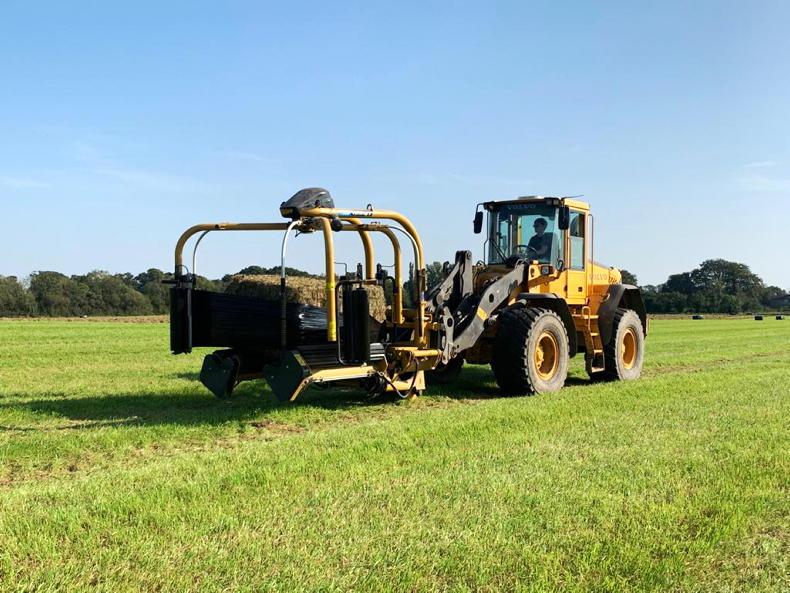
Bales are wrapped using a Tanco Q300v mounted on the front of a Volvo L60.
Patrick says it has been a game changer in terms of speed and reliability. It is hooked up to a Fend 828 and the combination can make up to 70 straw bales an hour and up to 40 silage bales an hour.
Bale lengths in the straw are dependent on the customer, in silage BACL makes 6x4x3ft (1,800x120x90mm). This bale size gives a weight of about 1.2t depending on the condition of the grass. The company usually runs the baler with all 26 knives engaged. This gives a 50mm chop length. Patrick says bales of this size and weight give the perfect load on an articulated lorry, as some of the bales are baled for sale. It also means they are not too heavy for farmers to manage with a tractor and loader setup.
Wrapping is undertaken using a Tanco Autowrap Q300. This wrapper can be mounted on either a three-point linkage or more commonly it is used on the front of a Volvo L60 loading shovel.
The “Q” stands for quadrangle; this hints at its ability to wrap square bales.
The Q300 has auto levelling, which levels the bales when they are being dropped to save any damage, and AutoStart, which automatically picks up the bale and gets started with one button.
Patrick finds the ability to wrap different bale sizes including rounds with the quick scan through the pre-programmed RDS controller very straightforward. Wrapping is always done in the field. There are two reasons for this – less handling of the bales before wrapping and no transporting on trailers before wrapping.
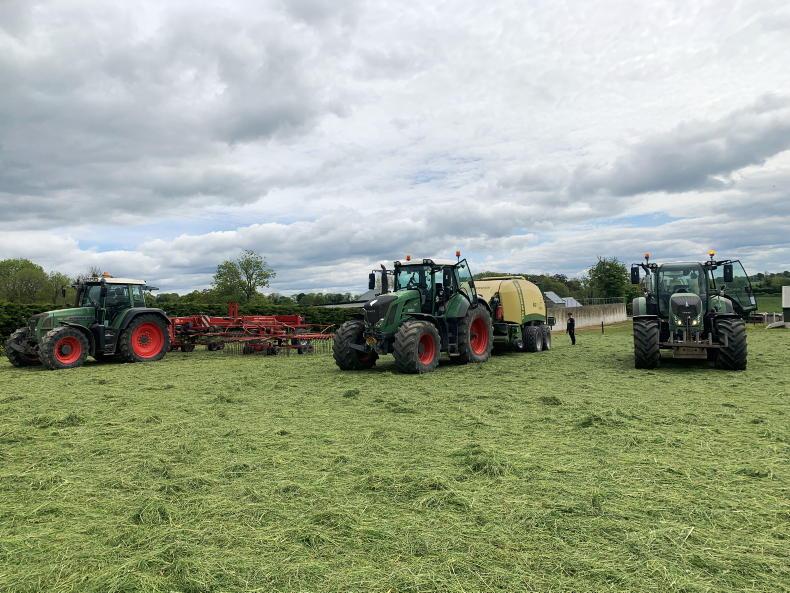
The company’s Fendt 818 is on a two-year-old Lely 615, which makes 20-24ft rows for the baler.
This is due to the density of the bales and the chance that a twine may fail or a knot slip if too much movement occurs pre-wrapping. Patrick said quality twine and plastic are essential when making these bales. The Q300 has been run in conjunction with an older Tanco Autowrap 1540.
The company has noticed that the two machines wrap at a very similar rate per bale but the Q300 manages a better work rate due to having three dispensers rather than two. This reduces the downtime for plastic changes dramatically. This gives the Q300 the ability to wrap up to 70 bales per hour and the 1540 about 40 bales per hour over a day’s work. This is putting six to seven layers of plastic on each bale.
New mower testing
Patrick has a close working relationship with Tanco Autowrap and over the past four seasons he has been involved in the testing of the Autocut M3 and M9 mowers.
The M3 is the front mower of the set and boasts a patented rail system. This gives a pivot point just above the level of the bed. Tanco claims there is 19° of rotation around the pivot point and 850mm of up and down travel, independent of the tractor’s front linkage.
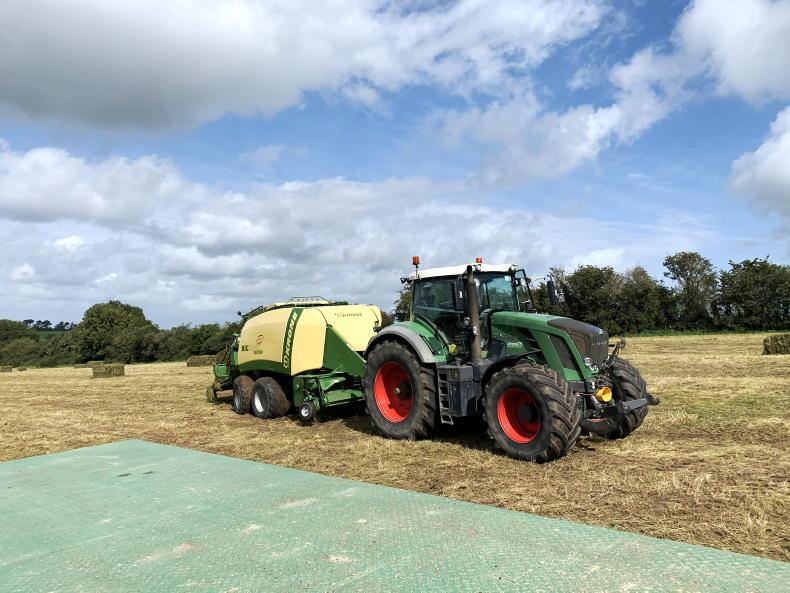
This outfit can bale up to 70 bales per hour in straw and 40 bales in silage.
Patrick agrees with these claims and says the mower seems to soak up the lumps and bumps with no problems.
The M9 is the rear set. These are trailed, with the weight of the mowers equally distributed between the tractor and the mower chassis. In transport mode the mowers fold on top of the chassis, which means that they are only 2m high. This is a considerably better height for road transport than normal butterfly units.
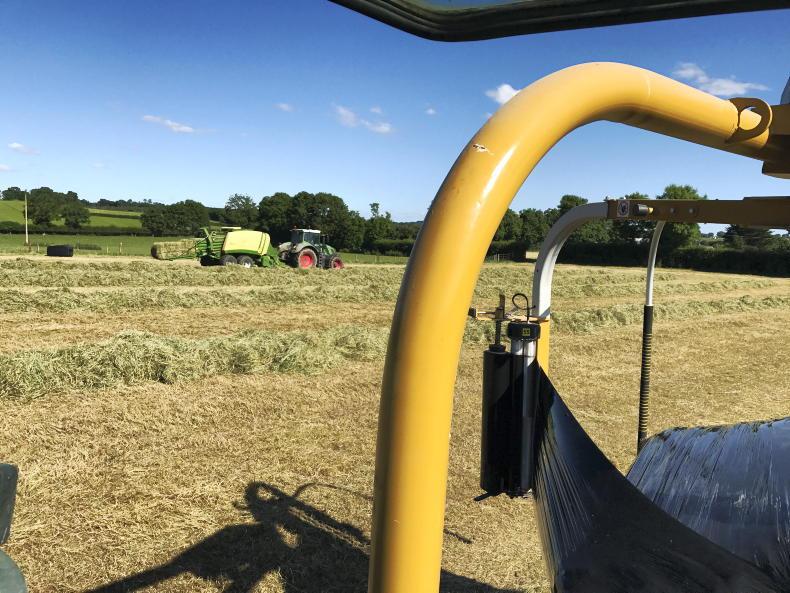
The wrapper works in the field to reduce the handling of the high-density bales before they are wrapped.
Last year Patrick invested in a set, having seen both the good and the bad of the mowers over the previous years. He finds that there are two main advantages to these trailed mowers. Firstly, the ability to attach them to a tractor in less than five minutes.
This is a considerable saving on time over the mounted set of triples which he ran previously. The trailed layout of the mowers also means that a lighter tractor can be used. This gives Patrick a choice of tractors to use and frees up the Fendt 828 for constant baler use.
Fendt fans
Long before Fendt tractors became fashionable, the Nolan family were using them. The first of them came in 1982 and since 1992 there has been no other brand in the yard. There are currently four in the BACL fleet and another one on long-term hire.

The Q300v and the 1290 make for a formidable baling and wrapping team.
A 2011 registered 828 is used for the heavy lifting, including the baler and a 6m trailer Horsch drill. A 171-plated 724 is used on the mowers and other lighter duties in the tillage contracting business. The others are an 818 from 2005 with an impressive 12,500 hours and a 152-registered 720. The hired tractor is an 820 on a 2012 plate.
Patrick says that he hopes to expand the business’s silage baling operation in the future with a mix of square and round bales. A Fendt belt baler was added to the operation last year and experimenting with wrapping them has been successful. The more services that a business offers, the more flexible it is for its customers.
Belan Agri Contractors Limited (BACL) is owned and operated by Patrick and Laura Nolan. Patrick is the third generation in the business. His grandfather started the business after the first world war with a steam-powered threshing set which moved around the area gathering up the harvest on all the local farms.
At that time Kildare was a tillage stronghold and that remains the case to this day. BACL’s main business is tillage-based, delivering a full stubble-to-stubble service to its customers. The company employs two full-time staff and an additional four when seasonal pressure comes on.

Belan Agri Contractors’ Fendt 724 runs the set of Tanco Autocut M3 and M9 mowers.
Up until about 10 years ago, Pit silage – both grass and maize – was a sizeable part of the business. A New Holland FR9080 self-propelled harvester was getting through the work. In conjunction with this, BACL started to offer a square baling and wrapping service to clean up paddocks for customers. At this stage the company was using a set of Taarup 5090 triple mowers, a New Holland BB960A and a trailed Taarup wrapper.
Growth of the wrap
Over the years, the company found that more and more customers wanted square-wrapped silage and haylage bales, the haylage for the local equine industry. Patrick has constantly improved the gear to make better-quality fodder in each bale.
The first big step was the introduction of a Krone 1290 high-speed in 2016, purchased for its ability to bale and chop both grass and straw. The baler has baled over 6,500 bales every year since it arrived.

Bales are wrapped using a Tanco Q300v mounted on the front of a Volvo L60.
Patrick says it has been a game changer in terms of speed and reliability. It is hooked up to a Fend 828 and the combination can make up to 70 straw bales an hour and up to 40 silage bales an hour.
Bale lengths in the straw are dependent on the customer, in silage BACL makes 6x4x3ft (1,800x120x90mm). This bale size gives a weight of about 1.2t depending on the condition of the grass. The company usually runs the baler with all 26 knives engaged. This gives a 50mm chop length. Patrick says bales of this size and weight give the perfect load on an articulated lorry, as some of the bales are baled for sale. It also means they are not too heavy for farmers to manage with a tractor and loader setup.
Wrapping is undertaken using a Tanco Autowrap Q300. This wrapper can be mounted on either a three-point linkage or more commonly it is used on the front of a Volvo L60 loading shovel.
The “Q” stands for quadrangle; this hints at its ability to wrap square bales.
The Q300 has auto levelling, which levels the bales when they are being dropped to save any damage, and AutoStart, which automatically picks up the bale and gets started with one button.
Patrick finds the ability to wrap different bale sizes including rounds with the quick scan through the pre-programmed RDS controller very straightforward. Wrapping is always done in the field. There are two reasons for this – less handling of the bales before wrapping and no transporting on trailers before wrapping.

The company’s Fendt 818 is on a two-year-old Lely 615, which makes 20-24ft rows for the baler.
This is due to the density of the bales and the chance that a twine may fail or a knot slip if too much movement occurs pre-wrapping. Patrick said quality twine and plastic are essential when making these bales. The Q300 has been run in conjunction with an older Tanco Autowrap 1540.
The company has noticed that the two machines wrap at a very similar rate per bale but the Q300 manages a better work rate due to having three dispensers rather than two. This reduces the downtime for plastic changes dramatically. This gives the Q300 the ability to wrap up to 70 bales per hour and the 1540 about 40 bales per hour over a day’s work. This is putting six to seven layers of plastic on each bale.
New mower testing
Patrick has a close working relationship with Tanco Autowrap and over the past four seasons he has been involved in the testing of the Autocut M3 and M9 mowers.
The M3 is the front mower of the set and boasts a patented rail system. This gives a pivot point just above the level of the bed. Tanco claims there is 19° of rotation around the pivot point and 850mm of up and down travel, independent of the tractor’s front linkage.

This outfit can bale up to 70 bales per hour in straw and 40 bales in silage.
Patrick agrees with these claims and says the mower seems to soak up the lumps and bumps with no problems.
The M9 is the rear set. These are trailed, with the weight of the mowers equally distributed between the tractor and the mower chassis. In transport mode the mowers fold on top of the chassis, which means that they are only 2m high. This is a considerably better height for road transport than normal butterfly units.

The wrapper works in the field to reduce the handling of the high-density bales before they are wrapped.
Last year Patrick invested in a set, having seen both the good and the bad of the mowers over the previous years. He finds that there are two main advantages to these trailed mowers. Firstly, the ability to attach them to a tractor in less than five minutes.
This is a considerable saving on time over the mounted set of triples which he ran previously. The trailed layout of the mowers also means that a lighter tractor can be used. This gives Patrick a choice of tractors to use and frees up the Fendt 828 for constant baler use.
Fendt fans
Long before Fendt tractors became fashionable, the Nolan family were using them. The first of them came in 1982 and since 1992 there has been no other brand in the yard. There are currently four in the BACL fleet and another one on long-term hire.

The Q300v and the 1290 make for a formidable baling and wrapping team.
A 2011 registered 828 is used for the heavy lifting, including the baler and a 6m trailer Horsch drill. A 171-plated 724 is used on the mowers and other lighter duties in the tillage contracting business. The others are an 818 from 2005 with an impressive 12,500 hours and a 152-registered 720. The hired tractor is an 820 on a 2012 plate.
Patrick says that he hopes to expand the business’s silage baling operation in the future with a mix of square and round bales. A Fendt belt baler was added to the operation last year and experimenting with wrapping them has been successful. The more services that a business offers, the more flexible it is for its customers.











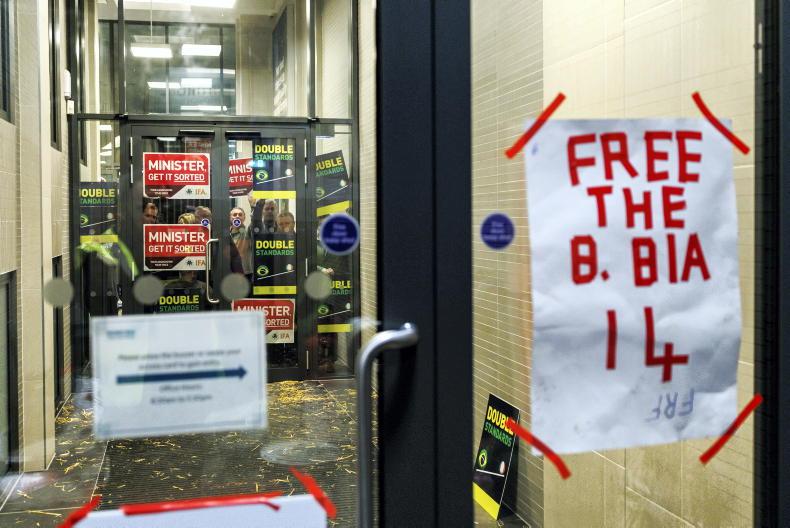

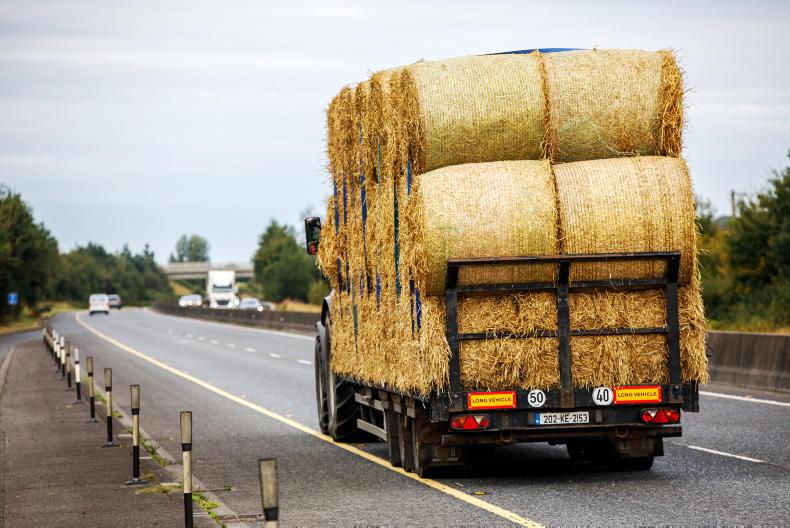
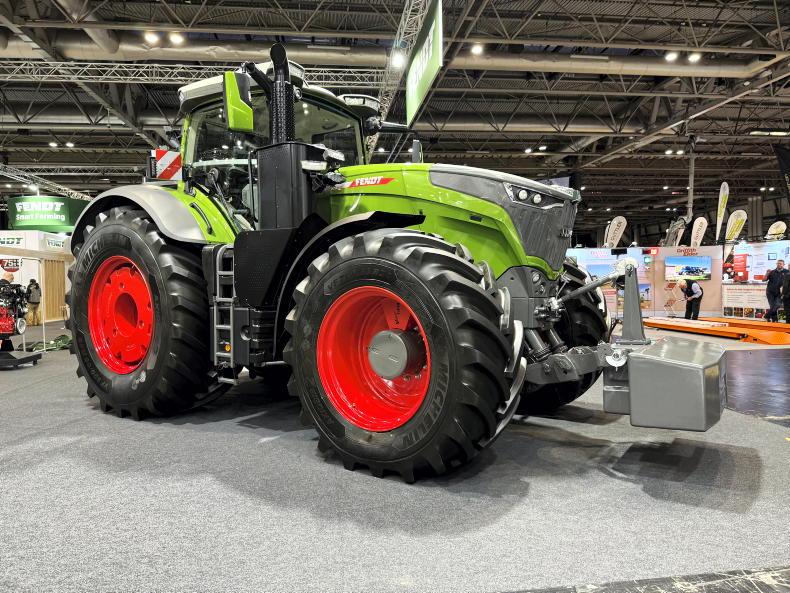
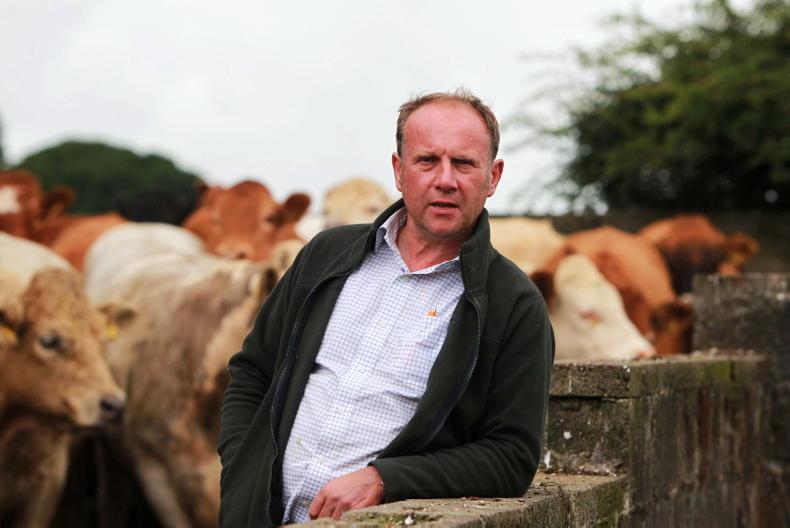
SHARING OPTIONS